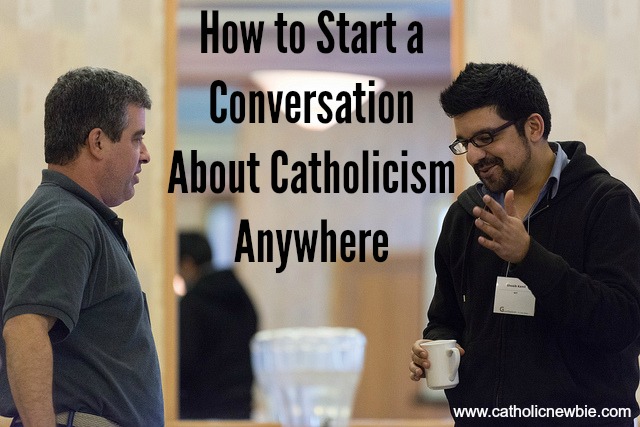As Catholics, we tend to dismiss our abilities to evangelize and to “witness” our Christian faith to others. We say we’re not good at it, at least not as good as Protestants, and we certainly don’t want to bash people over the head with our faith. No, we don’t!
But, as Catholics, I’ve discovered several ways to easily inspire a conversation about faith without being so obvious and without bringing out the “brick.” It’s also a way to follow Pope Francis’ theme of leading lives of joyful Catholicism, focusing on the positives of knowing Jesus and not starting the conversation with a bunch of “don’t”s.
Here are some simple ways to get that conversation going so you can positively witness to the faith by sharing your own experience and knowledge:
1) Wear some outward sign – I wear a Miraculous Medal and a cross. Lots of people wear crosses, so that doesn’t generally open the door to conversation. But my medal — time and time again — has led people to ask me what it is and led to a great conversation about faith.
2) Read the Bible – Catholic evangelist Hector Molina spoke at my parish’s mission retreat and he inspired this post with a story. He shared that when he’s flying to give talks around the country he has a captive audience of his fellow air travelers. He always carries his Bible and reads it, which often gives rise to conversation about favorite verses and ultimately religion, and even prays his rosary.
3) Pray the Rosary in public – This one will really get a conversation going and you’ve got to be brave about it! Can you be as bold as Hector and pray the rosary on the plane? If not, try a walking rosary at your local park or public path. Pray the rosary in rhythm to your steps as you carry it. You might not have a conversation by praying but you never know who is watching and what effect it may have on them.
4) Talk about going to mass, reconciliation, Holy Days and more – Casually mention to your neighbor, or your child’s friends’ parents or the fast food worker, what you’re doing or just did as it relates to church. They just might ask you for more information and give you the opportunity to explain.
5) Pray before meals – Of course, you should pray before meals anyway to thank God for our many blessings, but there’s an added bonus. People will notice. I’ve heard so many stories of people commenting to others about how great it was to see someone praying in public. Again, even if it doesn’t inspire a conversation, you never know what impact it might have on someone watching nearby.
6) Read a Catholic book – You should also be doing this anyway to grow in your faith! But carry one with you always, so if you have down time, you can pull out the book and read a few pages (side note: great program on How to Read More Books from Brandon Vogt here). Books are always a good conversation starter. I was at the park one day with my kids and reading St. Therese’s “Story of a Soul”. Boy did that start a conversation with the Protestant man sitting next to me. He did not have a good view of the Catholic church and we discussed the whole idea of “saints.” This was early in my Catholic days, so I’m not sure I had the best answers to persuade him, but I sure tried.
That leads me to my conclusion. When these conversations do start — and they WILL — be prepared! “Always be ready to give an explanation to anyone who asks you for a reason for your hope, but do it with gentleness and reverence, keeping your conscience clear.” 1 Peter 3:15
You can prepare yourself by reading great Catholic books, listening to shows on EWTN radio like Catholic Answers and Open Line, which give great explanations for common questions and misperceptions about Catholicism.
Also, consider blogging or journaling so you have fresh in your head stories from your own life about the power of God and God’s graces that have benefited you. No one can argue with your authentic experience. It also helps to know key Bible verses, especially when chatting with Protestants who have a largely Bible-only view of Christianity.
What things have you experienced that unexpectedly started a conversation about faith and Catholicism?




